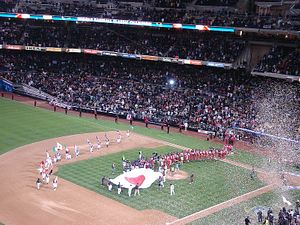Last night the United States won its first World Baseball Classic championship, defeating Puerto Rico 8-0 in the finals, behind a strong pitching performance by Marcus Stroman. The victory came on the heels of a 2-1 U.S. win over Japan at a rain-drenched Dodger Stadium on Tuesday evening.
Japan entered the tournament with the strongest resume, after winning the 2006 and 2009 tournaments, and making it to the semifinals of the 2013 edition. The United States began the 2017 WBC as a slight favorite, despite the presence of an extremely strong team from the Dominican Republic (the 2013 WBC champion). The Dominican team lost in second round pool play to Puerto Rico and the United States; Puerto Rico defeated the Netherlands, the strongest European team in the semifinals. The biggest surprise of group play came from Pool A, where extreme longshot Israel beat out a well-regarded South Korean and a decent Taiwanese team. China struggled, going 0-3 and losing by a combined score of 24-1 in Pool B.
While many of the teams included players from Major League Baseball, the event struggles to attract the very best players; only three of the top 11 players from 2016 (Jose Altuve of Venezuela and Robinson Cano and Manny Machado of the Dominican Republic) opted to play for their national teams. The WBC corresponds to spring training for many professional leagues, forcing players to choose between preparation and national commitment. WBC participation also requires delicate negotiation with the labor unions that represent American and Japanese players, who have insisted on insurance, drug testing regimens, and licensing revenue.
With early round games in Tokyo, Seoul, and Guadalajara, the WBC broke its 2013 attendance record. Games in Japan and San Diego were well-attended, although the tournament was not featured on a major American sports television network (most games could be found on MLB.tv). The tournament seems sufficiently popular in many countries to justify its continuation in the future, although it will continue to struggle to attract the best Major Leaguers if organizers cannot figure out ways of better protecting and incentivizing elite players.
Still, from a fan perspective the WBC should be considered a win-win; excellent players compete with each other in unfamiliar matchups in games that matter. And to the extent that the WBC increases the popularity of baseball in Asia (particularly in China, notwithstanding the national team’s 2-10 record over 4 WBCs), it helps to ensure a base of fans and players for the future.

































